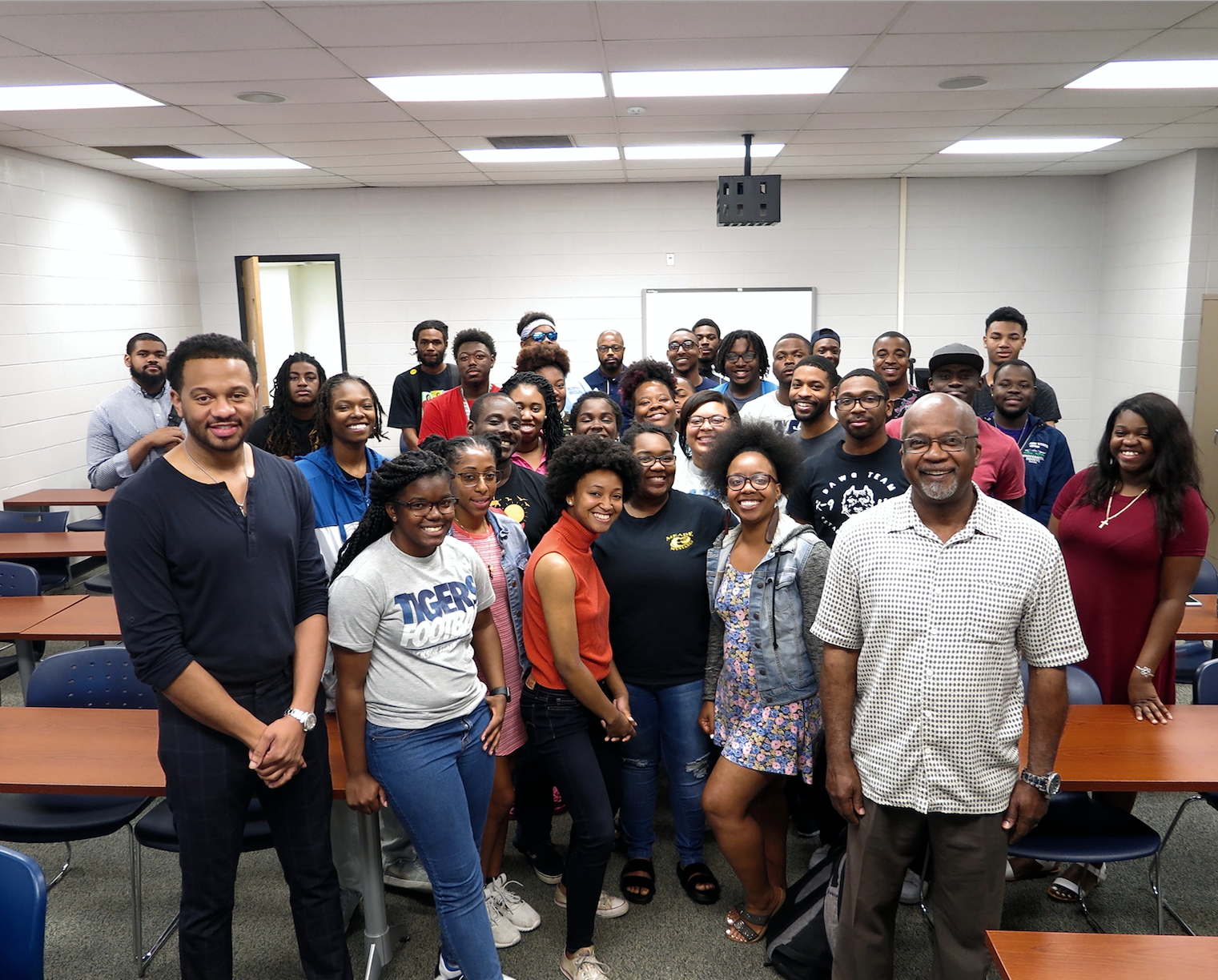
![]() [hr][hr]
[hr][hr]
On a Monday afternoon in April, attorney Jeffrey Graves is talking copyright law to a group of music technology majors at Jackson State University. The session is the last of several the ’06 music technology graduate voluntarily offered during the spring semester.
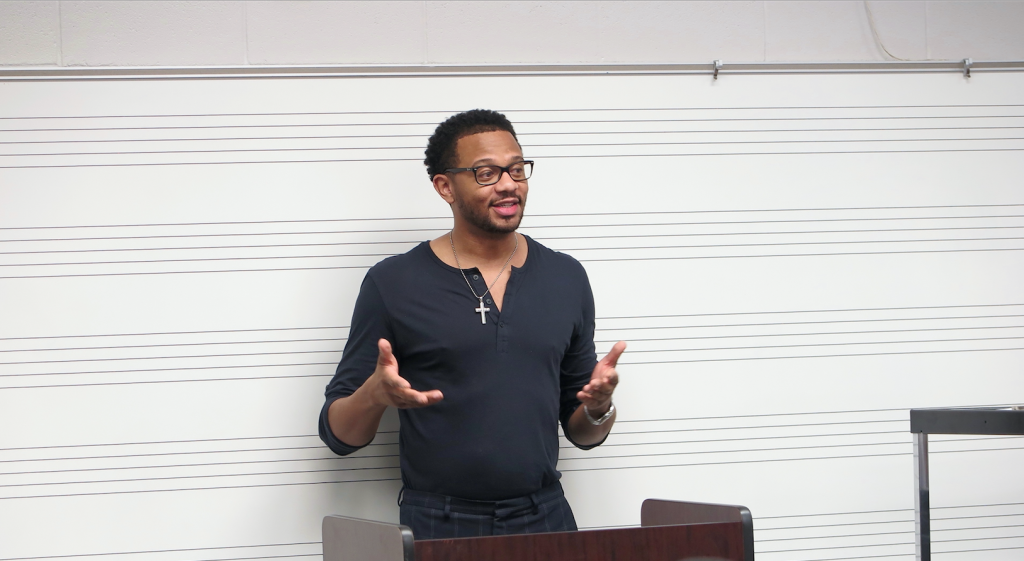
[dropcap]G[/dropcap]raves said he felt compelled to give back to his alma mater after witnessing a JSU Jazz Vocal Choir performance at the university’s opening of the Miles Davis Art Exhibit last year.
“I was super intrigued at their level of musicianship, and then I learned almost half of the students were music tech majors,” he said. “I was immediately moved by that. I was one of the first people to get a music tech degree from here (JSU).”
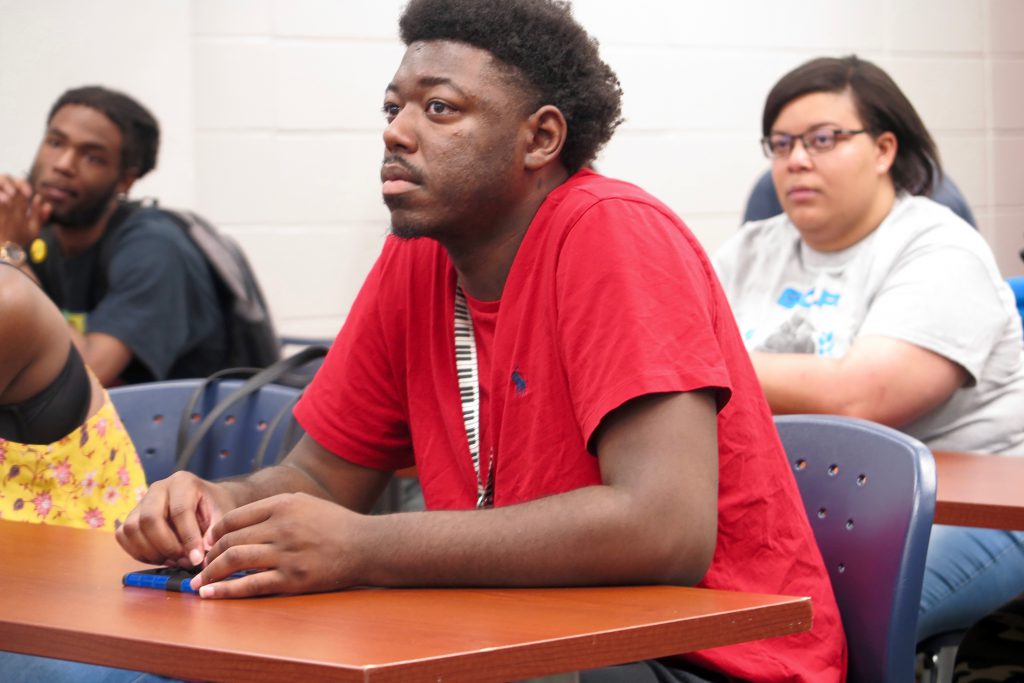
The alum explained that he began at the HBCU when the music technology program was in its infancy stages and was wowed by the increase in the program’s enrollment. He then expressed additional surprise upon learning that the curriculum had not entirely adjusted to encompass artists of today.
“I realized that a lot of these students were new industry types – beat makers, producers and musicians who are really good at what they do, but do not want to be band leaders,” he explained.
The students showed an appreciation for learning the fundamentals found in music theory classes and marching band experience but, Graves said, they also desire new and fresh information about the things they care about.
“They want to know more about beat making, streaming, beat leasing, selling music and songwriting, stuff that is not usually provided if you’re a traditional music education or performance major” said Graves, who shared his phone number with several students.
His one-on-one music discussions eventually led to a meeting with Dr. Lisa M. Beckley-Roberts, interim chair and assistant professor of ethnomusicology in the Department of Music. Together, they decided to offer music technology students a four-part seminar, led by Graves, that covered various aspects of the music business.
“Mr. Graves’ love of our program and desire to help our students and contribute to their success is a reflection of the deep and sincere investment that our Department of Music alums feel toward our programs,” said Beckley-Roberts. “His decision to take time out of his incredibly busy schedule to share his expertise and knowledge is remarkable.”
Beckley-Roberts explained that the seminars addressed issues that professionals in the music technology industry face as well as ways that students can use their time in the Department of Music to be better prepared after graduation.
“To have this information come from a professional in the music and entertainment industry who looks like them and comes from their own department was so powerful. It added value to the message and affirmed their own path,” said the interim chair. “I really can’t thank him enough. Our students have been eager for each of his presentations and seem to be more engaged with their course work as a result of his presentations.”
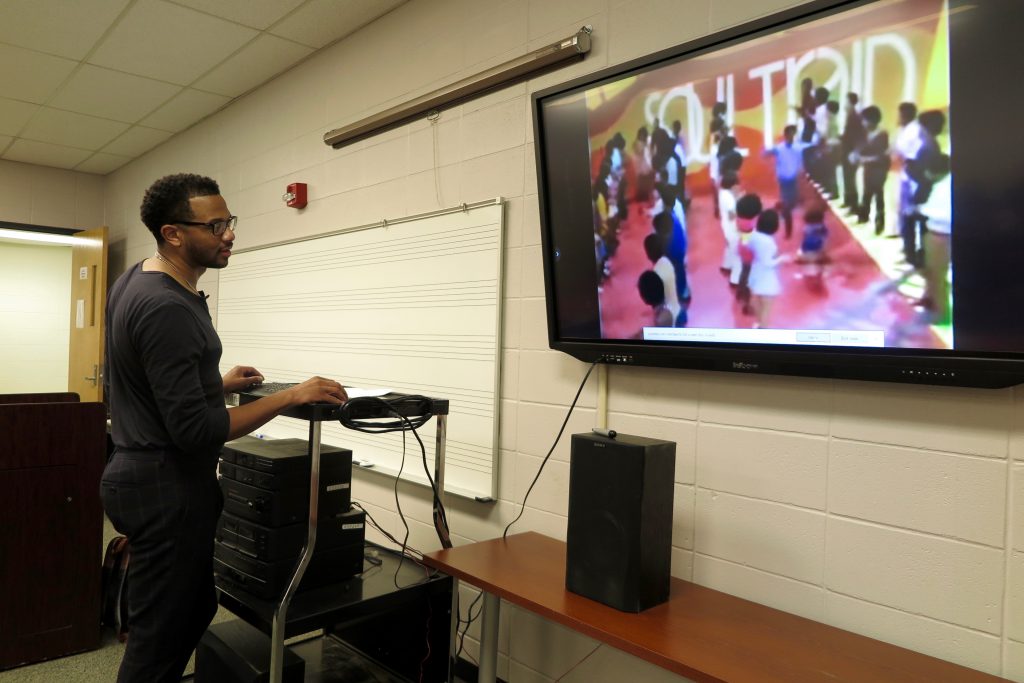
[dropcap]D[/dropcap]uring his copyright seminar, Graves also covered publishing and royalties and used examples like the “Blurred Lines” lawsuit filed by Marvin Gaye’s family against producer Pharrell and singer Robin Thicke to drive home his points. He also delivered thoughts on the evolution of music laws in the face of a changing musical landscape and the lack thereof in some instances.
Delvin Deener, music tech major, said the knowledge bestowed by Graves is very valuable. “Most of us don’t know the real world laws of copyright and publishing,” said the junior. Furthermore, Deener shared that the info received from the seminar can help him be a successful music producer.
Daria Beard was one of a few students waiting to talk to Graves after his presentation. The graduating senior said her goal is to be “the next Will Smith.” She took the opportunity to record Graves as he spoke.
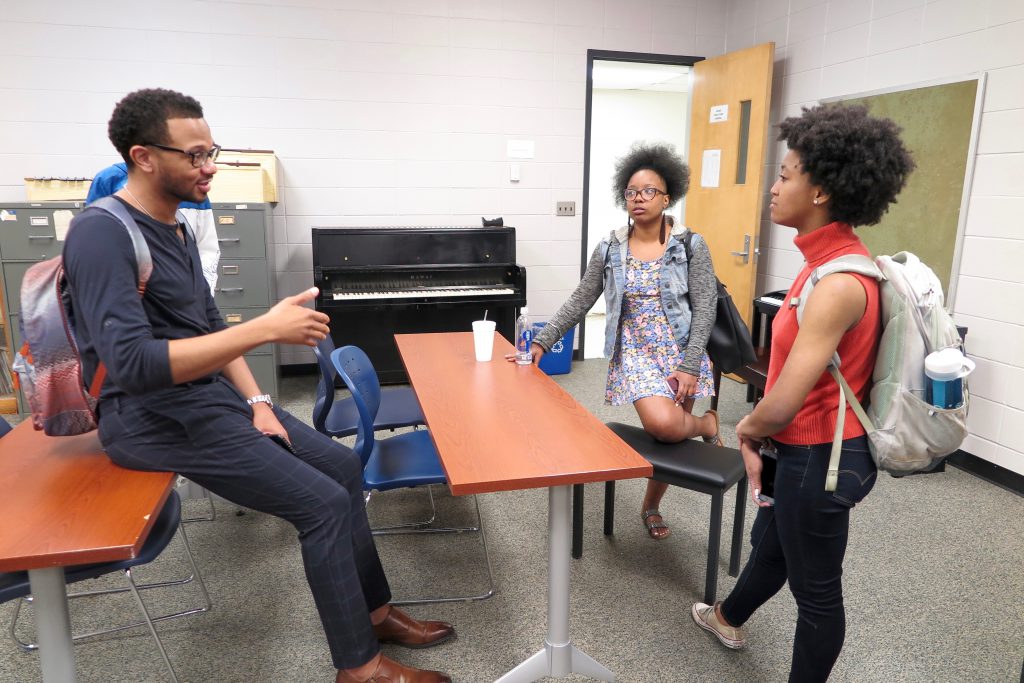
“This is like a master class,” said Beard. “I can play my recording back and listen more in-depth and look up things to further research for myself. I really appreciate him coming. It was really good.”
Having the business aspect of music is vital to sophomore Timothy Walker, and it’s the reason he wanted to hear from Graves. “Understanding what you need to know as a music artist, producer or whoever you are is important,” said Walker, also an aspiring audio engineer.
Having more than the business aspect is a phrase that best describes Graves. The self-proclaimed “band geek” played the saxophone for Peoples Middle School. At Murrah High School, he played alto sax, tenor, baritone and tuba and was a drum major his senior year. After graduating, he attended the University of Southern Mississippi on a music scholarship and later transferred to JSU where his mother, Dr. Bettye Graves, served nearly 30 years as an administrator before retiring.
“I got more into engineering and music production in college. I got me a (Yamaha) Motif 7 (synthesizer) workstation, a Roland Digital Recorder and was making beats by the bed,” said Graves. “That turned into big dreams of moving to California and doing a Kanye West, living in my van waiting on Jay-Z to pay me.”
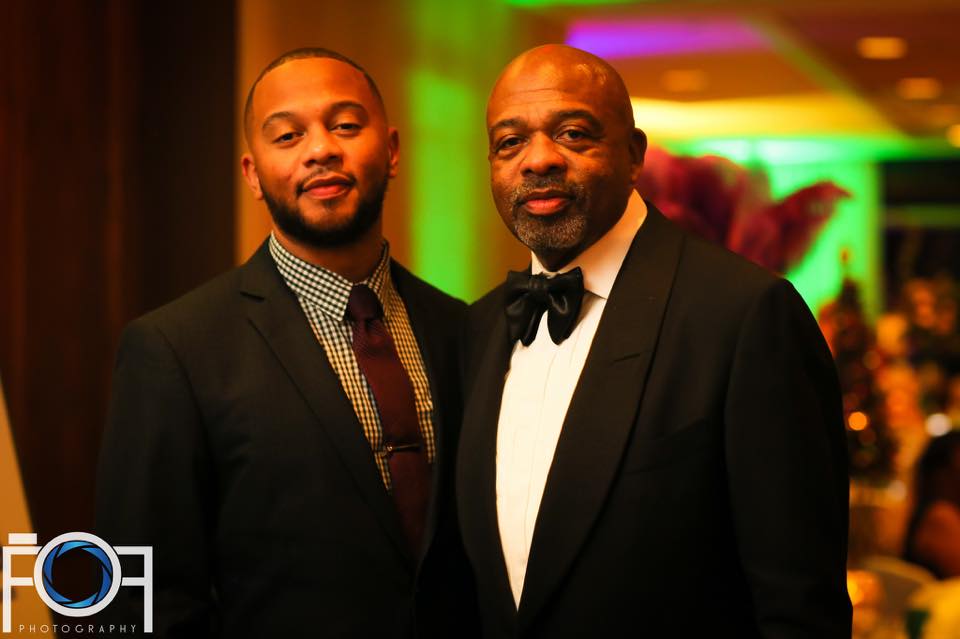
The entertainment industry did not quite align with his family’s legacy. His father is federal Judge James E. Graves, and his two older brothers are also attorneys. “Coming from that kind of background, expectations are high. I actually did pretty good in school up to a certain age.”
At 9, Graves along with his parents discovered that, unlike his siblings, he was more of an auditory learner. “Which is when my parents recognized why I had this love for music. So I think they realized that maybe they should focus on music since I learned by hearing,” he said. “I could be the fastest reader in the class but couldn’t really comprehend what I was reading. But I could hear a song and play it back note for note.”
The music tech major was determined to make his bones in the industry until he began interning with Ron Carbo, producer, engineer and owner of the Soul Kitchen Recording Studio which is widely used by artists inside and outside the state. Graves describes this time as the most significant part of his education at JSU.
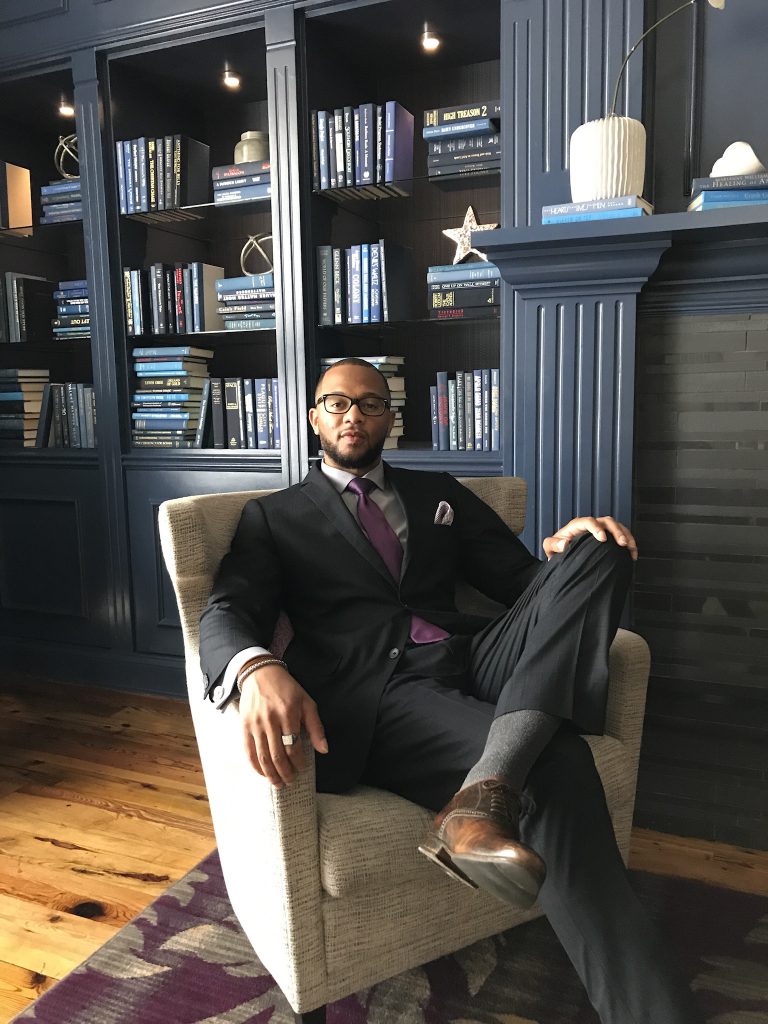
[dropcap]H[/dropcap]e explained that Carbo was the only industry-level producer with an industry-level studio in the area where he could intern locally. “A lot of my last year at JSU was spent doing independent study with him and watching him engineer sessions,” he said before adding that Carbo was the first person that told him to go to law school.
“He said the benefit is because I’m a producer and an artist. If I got a legal education, I could contribute more to the music industry than I ever could as a producer,” said Graves.
The 35-year-old credits Carbo for giving him a pro-artist mentality early on. He also agreed with his mentor’s belief that what artists lack is a legal understanding of entertainment and those who do get it end up working in favor of the label and not in favor of the artist.
Attending law school seemed a no-brainer decision for his mentor. “He had a love for music, and his father is a 5th Circuit Court of Appeals judge,” said Carbo during a phone call. “I knew he had a solid background behind him, the mentality, and the analytical skills to be a good attorney. But his love for music would make him a great entertainment attorney.”
In 2012, Graves received his law degree from the University of Mississippi School of Law. He passed the bar, and started working at Copeland and Cook in Ridgeland, Mississippi.
Graves left Copeland and Cook in 2014 with former Gov. Ronnie Musgrove, who opened a private practice. He then spent over three years at Sweet & Associates, describing it as the most extensive legal experience he received.
A year ago, he began Graves Legal Services specializing in general litigation, alternative dispute and entertainment law. “I wanted to create something that was fitting for me. I am still a creative first. I was never an 8-5 by-the-book guy. I survived it, did it and excelled but that wasn’t me,” said the father of two daughters, ages 10 and 17.
[dropcap]A[/dropcap]s an entrepreneur, one of the most significant tests he has received to date is negotiating a considerable music deal for Dear Silas, a local artist whose unique and catchy song “Skrr Skrr” went viral causing a slight bidding war with several major labels before RCA emerged the victor.
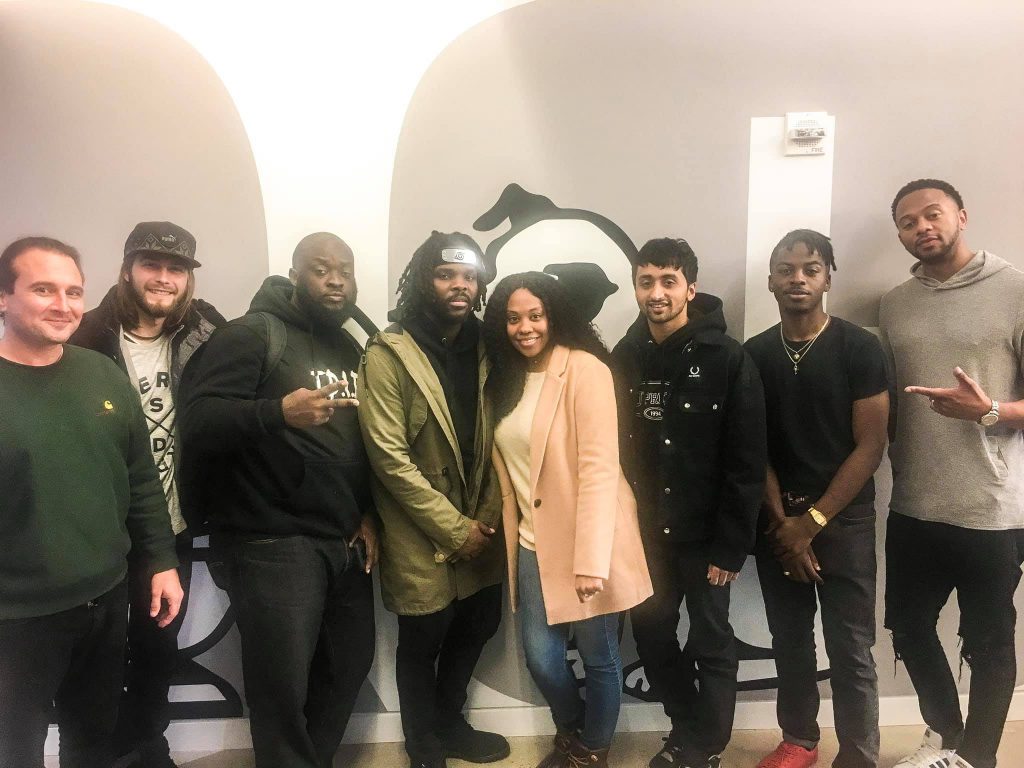
“Brad Franklin (Silas’ manager) called me one day. We knew each other, but never really called each other. He told me that ‘Skrr Skrr’ was picking up, labels are calling and they needed a legal contact, so he called me,” Graves explained.
Franklin said he knew the young attorney had a passion for music not just as an entertainment lawyer but also as a musician and had a studio engineer’s perspective.
“It’s one thing to know entertainment law, but it’s another altogether to know music,” said Franklin.
The phone call soon led to Graves, Silas, Silas’ wife, Alicia Stapleton, and Franklin waiting to board a plane to New York less than 48 hours after their initial conversation. He admits he and his wife, Eyra, were surprised by the sudden turn of events. However, there was little time to process.
“We’re in the airport and Brad is dressed like a manager. Silas was dressed like an artist, and I was dressed like a lawyer,” Graves laughs. “We all looked the part.”
Once in New York, the group was picked up by a chauffeur and dropped off at RCA/Sony headquarters with luggage in tow.
“We walked in there like we just hitchhiked,” he said before laughing. “I walked in like a super fan taking pictures of the Sony sign. It’s all these things…dreams you have, starting as a producer, which evolved into entertainment law and you see it playing out into a situation you could have never imagined. None of us planned it happening this way.”
After listening to Dear Silas’ Album “The Last Cherry Blossom,” with talent scout K.J. Jadav, artist & repertoire for RCA, and the labels CEO, it was time for negotiations.
“I literally got up and went to the restroom and threw up. It’s my first time doing a major label record deal, and I imagined the worse,” he divulged. “I thought I would walk into the room with 10 sophisticated New York lawyers and it’s just me.”
Calling his father for advice, he received just the push he needed. “The only thing my dad said was, ‘This is what you wanted. You know what to do,’ and he hung up the phone.”
Graves said he exited the restroom ready to go. Apprehensions further subsided when he realized it was one attorney, the lead counsel for RCA, and not the 10 he conjured up in his mind.
“I was just trying to make sure Silas and his wife were happy. Trying to make sure we understood what was happening and advising him on what they were proposing,” he said.
The group didn’t leave RCA until 9 p.m. Even still, Graves had to take the nearly 100-page contract with him to his hotel room.
“I had to marry myself to the contract because we were literally flying out the next day. All I could think to myself was ‘I can’t mess this up,'” he said.
When it was all said and done, Graves helped Dear Silas, a native of Jackson, sign a partnership between Dear Silas, LLC, the company started by the rapper, and RCA/Sony which allows him full creative control and the freedom to distribute music as he sees fit.
RCA re-released “The Last Cherry Blossom,” on April 26, 2019. The album, written by Silas, was produced and recorded in Crown Studios in the capital city. This deal is the first of its kind for a Jackson artist.
“It was fulfilling to know that I was able to survive the negotiations and had an understanding of what was going on. More importantly, Silas was comfortable with my decision. That’s always important when you’re representing someone with something life-changing,” he said.
Of Graves’ abilities, Franklin said he is a valued teammate of Ourglass Media Group, Franklin’s management company. “This won’t be the last big deal we close together.”
And Graves agrees. The attorney said he wants to build on what Silas has been able to do and have more of a focused effort in developing talent, producing high-quality music, and forcing major labels to Jackson instead of Mississippi artists relocating to make their dreams come true.
What he has accomplished thus far is everything that Graves said he has worked toward. “All the love I have for music all the love I have for the industry; this is the first time I can see the results of my labor.”






